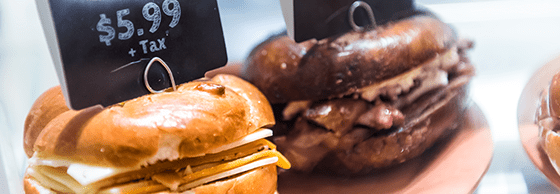Intellectual Property Insights from Fishman Stewart
Mini Article – Volume 23, Issue 8
Share on Social

Tax Loopholes and Lox: How a Cream Cheese-Stuffed Bagel Exposed a Delicious Sandwich-Tax Loophole
By Kristyn Webb
Inventors and designers have the challenging job of inventing and designing around many issues: prior art, competitive products, budgets, physics, consumer safety, market demand, supply chain hiccups, government regulations, and … taxes.
One bagel shop in New York has innovated its way around the state’s so-called sandwich tax, which adds approximately a 9% sales tax on anything that qualifies as a “sandwich.” New York’s Department of Taxation and Finance bulletin includes several suprising food items that fall into this category, like burritos, hot dogs, open-faced sandwiches, and buttered bagels. However, an unsliced and undressed bagel is not considered a “sandwich” subject to sales tax.
During Tax Season, H&H Bagels teamed up with cream cheese maker Philadelphia® to create the “Tax-Free Bagel”—an unsliced, unschmeared, H&H bagel filled with Philadelphia cream cheese. The cream cheese is injected into the bagel the way that jelly or custard is put into a filled donut. Think: stuffed-crust pizza, but with a bagel and cream cheese. Reviews have been mixed. Some consumers find the product too unconventional to be a true “New York style bagel” while others like the taste of a tax loophole.
We will see if other food establishments take similar measures to design around the tax code. Perhaps deconstructed burritos will never be a hit, but could hot dog stands start marketing hot dogs with buns sold separately?
Kristyn Webb is the Group Leader of Fishman Stewart’s Copyright Practice Group, and is currently earning a Master’s Degree in Copyright Law at King’s College London.

Published April 21, 2023


Related Content from Fishman Stewart
By 1930, efforts began in New York to replace Mother's Day with Parent's Day because men were more than just breadwinners. Those efforts didn't catch on, probably because in that era, women often spent more time in the home.
In February, Nike and Skims announced that they will be working together on a new brand, NikeSkims. The co-brand will create a new line of training apparel, footwear, and accessories specifically designed to meet the unique needs of women athletes.
Generally, federal courts have exclusive jurisdiction over copyright cases, and often, this presents an insurmountable paywall for individual artists and small businesses to vindicate their rights, especially where the value of the individual copyrighted works are relatively low.
Dedicated to raising public awareness about the importance of encouraging innovation and creativity throughout the world, the World Intellectual Property Organization (WIPO) annually observes World Intellectual Property Day on April 26 to showcase the role that patents, trademarks, industrial designs, copyrights and trade secrets play in our everyday lives.
Hold onto your foam fingers, sports fans – college sports just got a whole lot more interesting! The latest updates to Name, Image, and Likeness (NIL) rules are making student-athletes bigger than ever, and it’s not just about the game anymore.
Did a federal court in Louisiana recently decide that US copyrights are global rights? It seems so.
One of his most famous songs, “Lose Yourself” was recently at the center of a lawsuit. In 2019, Eminem’s publishing company Eight Mile Style sued Spotify claiming that Spotify streamed a number of its musical compositions without proper licenses.
One of the most common challenges is whether AI should be free to train on data that is protected by copyright and owned by third parties without first obtaining permission.
The U.S. Copyright Office (USCO) recently published its latest report on AI and “copyrightability.” In short, the USCO considers only some AI-generated works to be sufficiently creative as to deserve copyright protection, and thus, registration.
Back in the 1940’s assignments by independent contractors could be permanent and irrevocable. Things changed in 1976, when Congress overhauled the Copyright Act.
IDENTIFYING, SECURING AND ADVANCING CREATIVITY®












